The European Union needs to step up its efforts to consolidate its collective gas purchasing power in order to reduce the impact of price volatility on its economies.
In a report commissioned by the European Commission, former Italian Prime Minister Mario Draghi highlights the inadequacy of the EU’s current mechanisms for dealing with the growing instability of gas markets.
Europe, the world’s leading importer of natural gas and LNG, is not capitalizing sufficiently on its position to influence prices and avoid economic shocks.
The report points out that the EU remains excessively exposed to spot markets, where prices are dictated by fluctuations in supply and demand.
This increases the financial risks for member states and companies.
Draghi recommends strengthening joint purchasing, particularly for LNG, and diversifying sources of supply through long-term partnerships with reliable suppliers.
Limits of Current Mechanisms
In 2022, faced with soaring gas prices, the EU set up the AggregateEU mechanism to coordinate demand and aggregate competitive supply offers.
However, member states’ participation in this platform remains voluntary, which limits its effectiveness.
The report warns against the lack of intra-European coordination, which contributed to “unnecessary” price inflation during the energy crisis.
The lack of a coherent strategy has also left the EU vulnerable to the increased volatility of LNG, which is more expensive than pipeline gas due to liquefaction and transportation costs.
European gas prices peaked in 2022, with the benchmark Dutch TTF price peaking at EUR 319.98/MWh in August.
This situation has been exacerbated by strong competition on the spot market for limited supplies, particularly following the reduction in Russian pipeline gas imports.
With the planned development of new LNG capacity, notably in the USA and Qatar, some tensions may ease, but the report stresses that the EU must prepare for long-term challenges.
Regulating Markets and Reducing Speculation
To reduce gas price volatility, the Draghi report proposes stricter regulation of energy-related financial markets.
Inspired by the US example, such regulation could include financial position limits and dynamic caps to avoid price distortions.
The report also calls for the creation of a common regulatory framework for spot and derivative gas markets in Europe, ensuring integrated supervision.
The lack of coordinated regulation has allowed some companies to take speculative positions on derivatives markets, amplifying price fluctuations.
According to data from the European Securities Markets Agency (ESMA), five companies held around 60% of positions on certain markets in 2022, a concentration that has fuelled market instability.
By imposing stricter rules and removing certain exemptions for non-financial companies, the EU could better control the negative impacts of these practices.
Towards a coherent European Gas Policy
The EU needs to adopt a more proactive and strategic approach to its gas supplies.
This includes not only better management of joint purchases, but also reducing dependence on spot markets, which are heavily influenced by demand dynamics in Asia.
Diversifying sources of supply and concluding long-term contracts with stable partners are crucial to strengthening Europe’s energy resilience.
The Draghi report also calls for the harmonization of trading rules and increased monitoring of energy markets to avoid speculative behavior, which increases the risks for the European economy.
An integrated European gas market, supported by coherent policies and rigorous regulation, is essential to ensure price stability and secure energy supplies in the medium and long term.






















